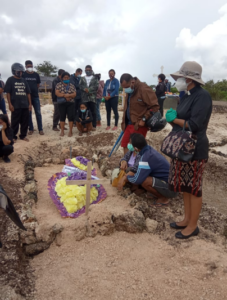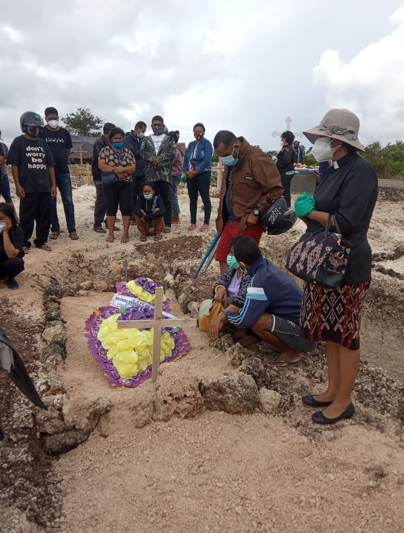COVID-weary Dry Bones
In part to promote Indonesia’s still fledgling efforts for mass vaccination, Rev. Mery Kolimon recently shared her personal experience in an open letter to members of the Evangelical Christian Church of Timor (GMIT). As an influential church leader, Mery was among the first individuals in our province to be offered the Chinese-produced Sinovac inoculation in January. Unlike the US and a number of European countries, Indonesia is not prioritizing the elderly for vaccinations, but rather those active in the workforce, beginning with urban centers. Because the majority of Indonesians live in extended families, so goes the rationale that those working outside the home should be protected first so they don’t transmit the virus to the young and old who live with them.
Mery’s letter includes a reflection on Ezekiel 37, GMIT’s chosen theme to guide its ministry during the pandemic. God orders Ezekiel to speak to dry bones scattered through an entire valley—a ghastly image—and to call the spirit from the four winds to breathe life into them. Mery sees three kinds of dry bones in GMIT’s Covid-19 context that has intensified in a first serious wave of infection since Christmas and New Year’s. Dry physical bones of those who have died fill plots in the large “Covid cemetery,” cleared in grim anticipation just last year on the outskirts of the provincial capital. Mental bones dry up when our ability to use logic and learn from science is threatened (perhaps due to fear or psychological stress). Spiritual bones become dry and brittle when one’s faith surrenders to hopelessness and cynicism. Mery writes to church members here in the islands of southeastern Indonesia, encouraging them to embrace vaccination as one of God’s four breath-of-life winds. In doing so, she implies that Ezekiel’s authority to summon the Holy Spirit to infuse dry bones with life is not his alone, but something the church shares, too. This is an important message for GMIT members given that stigma, shame, and ensuing silence about infection have been significant stumbling blocks to local efforts to advance testing and tracing.

Mery’s letter invites further reflection. Another wind GMIT calls forth these days seeks to bring fresh breath to rites of passage for the dead, customs now threatened as potential super-spreaders. Prior to the pandemic, the communal aspect of life in eastern Indonesia was intensely experienced during wakes. Families and friends from near and far gathered at the home of the deceased for several days. Each night, mourners, arriving in small groups, would gather for a worship service—loved ones draping themselves over the corpse, tearfully hugging and kissing the deceased and each other. Women squatted close together over fire-stoked pots to cook for those who sang or played cards into the wee hours of the night. The funeral service of hymns and prayers, the reading of a long obituary and an even longer sermon, would culminate with wails of grief at the sound of nails being pounded into the coffin. The funeral crowd would accompany the family to the cemetery for the burial, then return to the family’s home for a final service of thanksgiving followed by a common meal. The longer the funeral, the greater the dignity conferred. The process offered public grieving and closure that contributed to healing.
Funeral ceremonies are, by tradition, elaborate, even for the cash poor whose family burials are supported by abundant contributions from neighbors and members of large, extended families. Now, however, protocols require burial of Covid-19 victims within four hours, conducted by anonymous spooks in hazmat suits that convey their own eerie fear. It is one of the few protocols strictly and consistently enforced here. The rushed, often brusque, process from hospital bed to the hospital’s “corpse room” to the barren Covid cemetery has left many families with a deepened sense of loss and confused anger at being robbed of cultural practices that provide solace.
The GMIT Synod is scrambling to respond in several ways. For months, GMIT’s team of two pastors, designated to accompany families from the hospital to the grave, was enough. But as the numbers of those dying continues to grow, GMIT now seeks to involve pastors of the family’s local church, equipping them to respond to this particular and urgent pastoral need. There are spontaneous responses as well such as online funerals or the online prayer circle I recently joined with many pastors to lift up prayers and words of encouragement for a fellow pastor who was able to hear us, albeit remotely, from her hospital bed. Sadly she died the next morning. The Synod also issues guidelines to its congregations on matters such as how to conduct weekly worship, communion, and wedding services, and, now that the need is sorely felt, ways to remember with dignity those who have died while still observing current health protocols. Despite shortcomings, these procedures offer guidance and, by joining them with liturgies and theological reflections, refuse to surrender Christian hope and meaning about life and death.
Mery writes: “God brought Ezekiel into the valley of very dry bones…the church isn’t carried by God to avoid disaster, but rather guides it to enter into and struggle in the very middle of the valley that threatens life.” This reminds us that a context of deep suffering—whether it be individual and institutional Covid-weary bones, or threats to democracy that suck the moral marrow from our bones—is the “ground zero” that we are called to enter and from which we are meant to bear witness to winds that breathe life. Without that grounding, there is no witness, just dry piety. When breath itself can be a harbinger of death, resuscitation has shifted from a human’s saving breath to the joints of a mechanical ventilator, and we live muffled behind masks, holding our breath to ourselves—how do we still welcome the Holy Spirit as breath? How are we to grasp its promise of life when so many gasp in pain? I continue to learn from GMIT friends how a reinterpretation of Biblical metaphors, such as Ezekiel’s summoning of the four winds to breathe life into dry bones, continues to hold promise.
Karen Campbell-Nelson serves with the Evangelical Christian Church of West Timor in Indonesia. Her appointment is made possible by gifts to Disciples Mission Fund, Our Church’s Wider Mission, OGHS and your special gifts.

